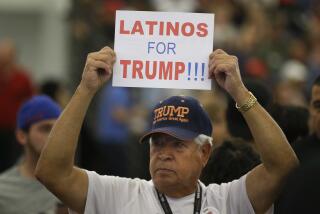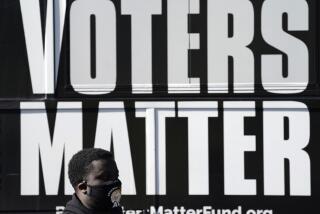ELECTIONS ’92 : Clinton Back to Courting Core Democrats : Campaign: Partisan voters take on new importance now that Perot has siphoned off independents and Republicans.
- Share via
With polls diverging on the extent of his lead--but most agreeing it has narrowed--Bill Clinton is due to arrive in Detroit today on a mission that has acquired new urgency: energizing the core Democratic vote.
After spending most of the presidential campaign courting independents and moderates, he may need to be carried over the finish line by traditional Democrats.
For Clinton, the support of reliable Democratic voters has become more important because Ross Perot has siphoned away many of the independent- and Republican-leaning voters who had earlier swelled the Democrat’s margin against President Bush.
In effect, Perot has narrowed the breadth of Clinton’s appeal--and forced the Arkansas governor, who has tried to sell himself to swing voters as a “new Democrat,” to depend on a coalition that, demographically, resembles the ones that bolstered such old Democrats as Hubert H. Humprhey.
This new calculus has raised the stakes for Clinton on efforts to encourage a large turnout next week from such core party constituencies as minorities and union members. “Turnout of the core Democratic vote is crucial in a race where Perot is a strong finisher,” says Kirk Adams, director of the Democratic get-out-the-vote campaign in Texas.
That’s especially true across the South and parts of the Midwest. In a three-way race with Perot and Bush, Clinton may be able to win Southern states from Texas to Georgia with only about one-third of the white vote if he can generate a high turnout among minorities.
In Texas, the base Democratic vote of minorities and die-hard “yellow-dog” white partisans is about 37%. “If we can produce that vote, we will be very close to winning a three-way race where Perot is at 20%,” says Adams.
In states such as Michigan and Ohio, Perot’s success at peeling away independents, and to a lesser extent blue-collar Reagan Democrats, has made Clinton much more reliant than only a month ago on high turnout among blacks.
“Bush can hurt Clinton here if the core Democratic vote doesn’t turn out like it should,” says Ed Sarpolus, a Democratic pollster based in Lansing, Mich.
Even if Perot slides in the polls, Clinton may find himself depending on a high Democratic turnout. That’s because the Perot supporters most likely to defect are college-educated white men, and that group has traditionally voted Republican, noted Stanley B. Greenberg, Clinton’s pollster.
This shift in the battlefield has reopened some questions in Democratic ranks about whether Clinton has spent too much time trying to win back suburban defectors, rather than energize low-income and minority voters in the cities.
“His situation isn’t desperate, but he should have been thinking a little bit more about what he could do in terms of ginning up the black vote,” says David Bositis, a senior research associate at the Joint Center for Political Studies.
Sensitive to those charges, the Democratic National Committee sent Jesse Jackson on a national tour to boost black registration and turnout.
Ironically, although the tightening polls are causing other headaches for Clinton, they probably will help his get-out-the-vote efforts, which aides had worried would be stymied by the perception that he had already won.
“The last week, we’ve had more and more volunteers calling in,” said Michael Whooley, who directs much of Clinton’s get-out-the-vote efforts. “People want to help.”
Clinton’s campaign has organized phone banks that will begin calling millions of prospective Clinton voters over the weekend and plans to have tens of thousands of volunteers on Election Day knocking on doors.
The campaign has also organized a series of campus groups to boost turnout among young voters. In the latest Los Angeles Times survey, Clinton’s margin over Bush was widest among those 18-29, a group that traditionally has been the least diligent about voting.
Overall, most signs point to a high turnout, many observers say. Audiences for the three presidential debates topped 80 million--peaking at more than 90 million for the last encounter. Polling for the Bush campaign provided to The Hotline, an electronic political newsletter, shows 66% of voters describing themselves as very interested in the campaign--up from 43% at this point four years ago. And, in Texas, with several days of eligibility remaining, more than twice as many people have taken advantage of the early voting program as in 1988, Adams says.
Brownstein reported from Los Angeles, Lauter from Arkansas.
More to Read
Get the L.A. Times Politics newsletter
Deeply reported insights into legislation, politics and policy from Sacramento, Washington and beyond. In your inbox twice per week.
You may occasionally receive promotional content from the Los Angeles Times.











